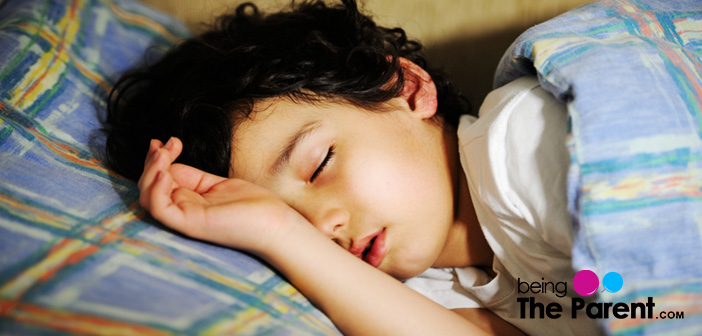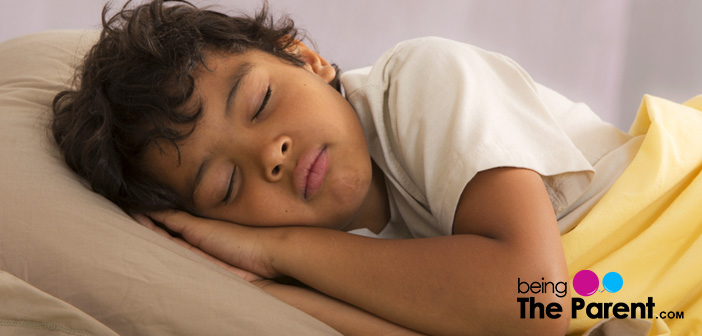
Why Do School-Going Children Snore?
5 min readWritten by Editorial Team

Grown-ups are not by any means the only ones who snore! Snoring while sleeping is fairly common among the kids. Studies show that Seven percent to 10% of children snore on the most night while around 20% of children snores occasionally.

Why Does Snoring Happen In Children?
Snoring happens when the air is not able to circulate freely through one’s nose and throat. Throughout the time of sleeping, the muscle in the upper airway sometimes tends to relax a bit more – resulting in the collapsing of the airway. This unsteady movement of air will result in vibrating the tissues of the palate (roof of mouth), nose and throat. These vibrations create snoring sound.
Is Snoring In School Going Children Sign Of A Problem?
Even though snoring obviously is not a normal activity of the body, it also generally cannot always be an indication of some health issue of the child. Most of the children who snores are found to be fit as a fiddle. ‘Primary’ or normal snoring will not interrupt their sleep. Their mental and physical development will be similar to the children who do not snore.
When Can Snoring Be Considered A Problem Among School Going Children?
Severe snoring that hinders the sleep of the child is found in about 2% of children who snore. Their snores could be an indication of underlying sleeping or breathing problems which can be life-threatening. Children who snore loudly are likely to have twice learning problems than normal children. Delayed growth and cardiovascular problems are also found to be associated with severe snoring.
Therefore, being a parent you should be conscious if some changes occur to your child’s sleeping or breathing habits.
What Are The Causes Of Snoring In School Going Children?
There are several factors that can cause snoring in school going children. Some of the reasons are temporary like snoring associated with a stuffed nose, which will vanish when the illness goes. While, some reasons are rather persistent such as anatomical defects. Some of the reasons are:
- Anatomical components: In due course the children born with a small jaw and a small airway develop habitual snoring as they grew.
- Blocked nasal passage: Common cold or sinus infection can bring on stuffed nose or blocked airways. Anything that intercepts your child from breathing through the nose can cause snoring
- Deformities of the nose: A child born with deviated septum (cartilage that separates two nostrils) will find some difficulties to breathe properly especially when he will lie down to sleep
- Allergies: Seasonal allergies like pollen allergy can cause stuffy nose which in turn can set off snoring among school going children.
- Obesity: Obesity has a significant role in causing snoring in school going children. Extra bulky throat tissue due to obesity can increase the chances of the child to snore. Obesity in kids can even cause multiple health issues
- Enlarged glands in the throat: Among some children, the tonsils and adenoids are found to become enlarged and swollen persistently. Many children who snore are found to have this problem
- Medicines: When the children take some medicines, especially muscle relaxants, for other health problems, they will relax the throat and tongue muscles and thus result in snoring
Snoring is also one main symptom of sleep-related breathing disorder (SRBD).
What Is Sleeping And Breathing Disorder Associated With Severe Snoring?
Sleep-related breathing disorder (SRBD), though not rare among children, but is still not easily diagnosed in most cases either.
Obstructive sleep apnea syndrome (OSAS) and upper airway resistance syndrome (UARS) are the common sleeping and breathing disorders associated with snoring.
What Are The Consequences Of Sleep-related Breathing Disorder In School Going Children?
There are several after-effects that result from the restlessness and poor quality of sleep experienced by school going children with sleep-related breathing disorders like:
- When your child wakes up after an un-refreshing sleep, it will make your child’s day tiresome
- Difficulty in concentration will make the children perform poorly in his class as his learning capacity is affected
- Bed wetting is another consequence. As the children are so anxious to sleep they tend to ignore the urge to urinate resulting in bed wetting. This could be more embarrassing for them and can have a psychological impact
- The children complain about nightmares and are found to develop night terrors associated with the SRBD

How Is Obstructive Sleep Apnea Syndrome (OSAS) Different From Upper Airway Resistance Syndrome (UARS)?
Kids with upper airway resistance syndrome wakeup now and then during their sleep as a result of resistance in the airway or due to exerted snoring. But the level of oxygen and carbon dioxide in the blood or the tissues in the child will remain intact.
Sometimes, the collapsed airway of the kids with obstructive sleep apnea syndrome does not open. The child will struggle to breathe and wake himself from sleep in order to catch his breath and then go back to sleep. The level of carbon dioxide in the blood and the tissues will escalate and the oxygen levels drop down as breath-in is completely stopped.
Sleep apnea is commonly found among the children with Down syndrome.
When Should I Be Concerned About My Child’s Snoring?
You should be concerned about your child’s snoring if:
- He stops breathing in short intervals and gasps and completely wake up frequently
- He shows difficulty to wake up after a long night sleep
- He falls asleep or shows tendency to daydream in school or at home
- He has not out-grown wetting the bed especially when the snoring accompanies
- He sweats heavily during sleep when others are not feeling hot
- He starts the day with a head ache which indicates he is not sleeping properly
- His teacher complains of some behavioral problem at school or daycare
- He shows hyperactivity
- His teacher complains he has trouble concentrating
How Can I Treat My Child’s Snoring?
The treatment for snoring varies with the cause. Occasional and light snore in the children can be eliminated by:
- Tilting the head rest of the bed a few inches upwards
- Changing sleeping position from back to a side
- Eating a light dinner
- Insisting the child develop a regular sleeping pattern
- Losing weight as the obesity aggravates the snoring
Heavy snoring needs medical attention. Take the child to a medical practitioner and he will fix the treatment after finding out the reason behind the snoring.
- Snoring due to allergy can be eliminated by avoiding the contact with the allergen
- Congestion of the nasal tract can be eradicated by taking the medicines prescribed by your child’s doctor
When Is Surgical Treatment Recommended For Snoring?
Surgical treatment is suggested in:
- Snoring due to deviated nasal septum. When the position of the septum is corrected, the snoring will be stopped
- Enlarged tonsils and adenoids can be removed if they trigger snoring in children (adenotonsillectomy)
What Is PAP Treatment?
Positive air pressure treatment is suggested for children with OSAS. A mask is worn over the nose. A gentle and steady flow of air through this mask will keep the air way open and prevents the child from waking up to catch the breath.
Now you know that snoring is not a simple thing that could be ignored. When your child snores, you might be a bit amused, maybe thinking that “he snores just like his father!” But persistent snoring could indicate symptoms of any health problems that you should be aware of. Therefore, it is always better to consider the health factors of your child before coming to such conclusions.

Editorial Team,
With a rich experience in pregnancy and parenting, our team of experts create insightful, well-curated, and easy-to-read content for our to-be-parents and parents at all stages of parenting.Read more.
Responses (0)
Want curated content sharply tailored for your exact stage of parenting?
Related articles

Top 10 Best Eye Exercises For Kids to Improve Vision

Parallel Parenting – Pros and Cons

Slapped Cheek Syndrome(Fifth Disease) in Children – What is it, Symptoms and Tips to Prevent

Toilet Training Kids With Autism – Some Helpful Tips

Sleep Talking in Kids – Is it Common and Top Tips to Deal With

Enema For Children – Is it Safe?
Sponsored content
Discover great local businesses around you for your kids.
Get regular updates, great recommendations and other right stuff at the right time.





